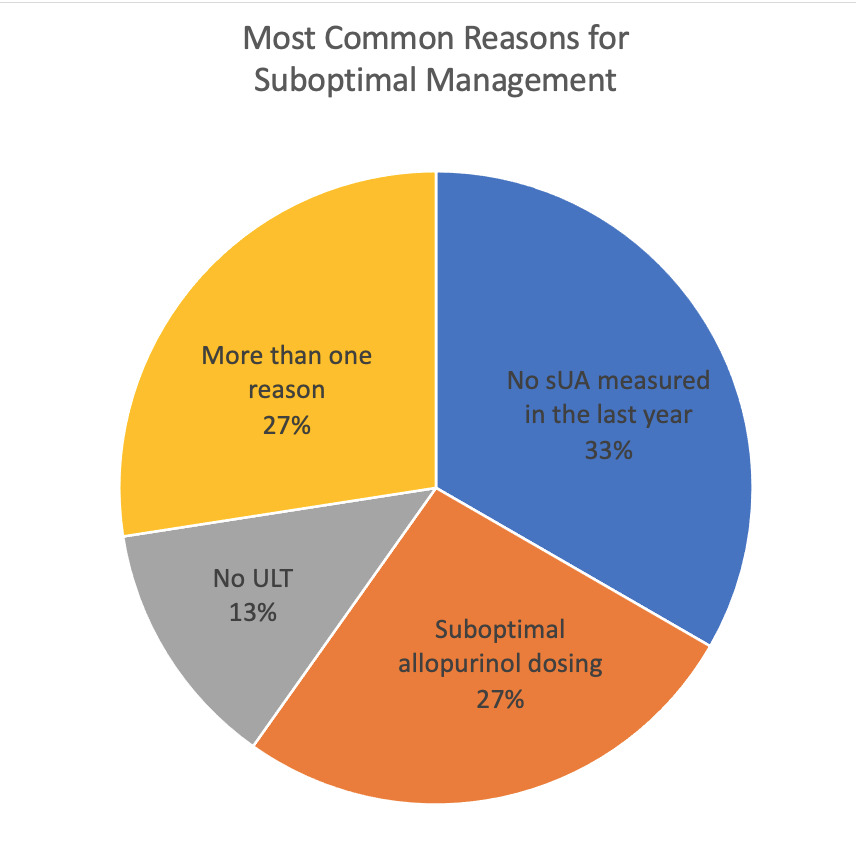Session Information
Date: Tuesday, November 14, 2023
Title: (1895–1912) Measures & Measurement of Healthcare Quality Poster II
Session Type: Poster Session C
Session Time: 9:00AM-11:00AM
Background/Purpose: Patients with gout and chronic kidney disease (CKD) are often not appropriately managed with goal-directed urate-lowering therapy (ULT). To address deficits in management of gout patients with CKD, we aimed to understand how their ULT was managed by primary care within an academic health system.
Methods: We used Slicer Dicer, an analytic tool within our electronic health record (EHR), to identify patients seen within the primary care health system associated with our academic medical center between 02/01/2022 and 02/01/2023 who also had an ICD-10 diagnosis code related to gout and CKD 3, 4, or 5. 121 charts were manually reviewed to determine patient’s glomerular filtration rate (GFR), stage of CKD, serum uric acid (and whether it was checked in the past year), urate-lowering therapy (and dose if applicable), and whether their gout was optimally managed according to the 2020 American College of Rheumatology Guideline for the Management of Gout. To address any seasonal factors, we reviewed charts of patients seen during the first weeks of April 2022, July 2022, October 2022, and January 2023.
Results: 3,371 gout patients with CKD were seen by a primary care provider between 02/01/2022 – 02/01/2023 in our health system. Of the 121 patients further analyzed, 40% had CKD 3, 35% had CKD 4, and 25% had CKD 5. The average GFR was 28.5. A total of 113 patients (93%) had a uric acid available to review. Among all patients, 52% (n = 63) had a serum uric acid checked within a year of their appointment, of which the mean serum uric acid was 7.8. 77% (n = 93) had an active prescription for allopurinol or febuxostat, and 96% (n = 116) were managed primarily by their PCP and had never seen a rheumatologist. Overall, 16% (n = 19) of all the patients reviewed had optimal management of their gout according to ACR guidelines. The most common reasons for suboptimal care were: no serum uric acid measured in the last year (33%, n = 34), suboptimal ULT dosing (27%, n = 27), no ULT prescribed (13%, n = 13), or a combination of these factors (27%, n = 28) (Figure 1).
Conclusion: There are deficits in management of gout patients with a diagnosis of CKD which may lead to worsening morbidity and mortality. Many of these patients are not being treated to goal with suboptimal doses of urate-lowering therapy or no urate-lowering therapy at all. We speculate that this trend may be due to a number of reasons including gaps in knowledge by primary care regarding ULT in patients with a diagnosis of CKD and/or inaccurately in the “normal” range for serum uric acid in the EHR (abnormal is defined as 8 or above). Overall, these findings suggest the need for an educational initiative or health-systems based intervention to address the care of these patients.
To cite this abstract in AMA style:
Eder L, Leverenz D. Identifying and Addressing Suboptimal Urate Lowering Therapy in Gout Patients with Chronic Kidney Disease [abstract]. Arthritis Rheumatol. 2023; 75 (suppl 9). https://acrabstracts.org/abstract/identifying-and-addressing-suboptimal-urate-lowering-therapy-in-gout-patients-with-chronic-kidney-disease/. Accessed .« Back to ACR Convergence 2023
ACR Meeting Abstracts - https://acrabstracts.org/abstract/identifying-and-addressing-suboptimal-urate-lowering-therapy-in-gout-patients-with-chronic-kidney-disease/

